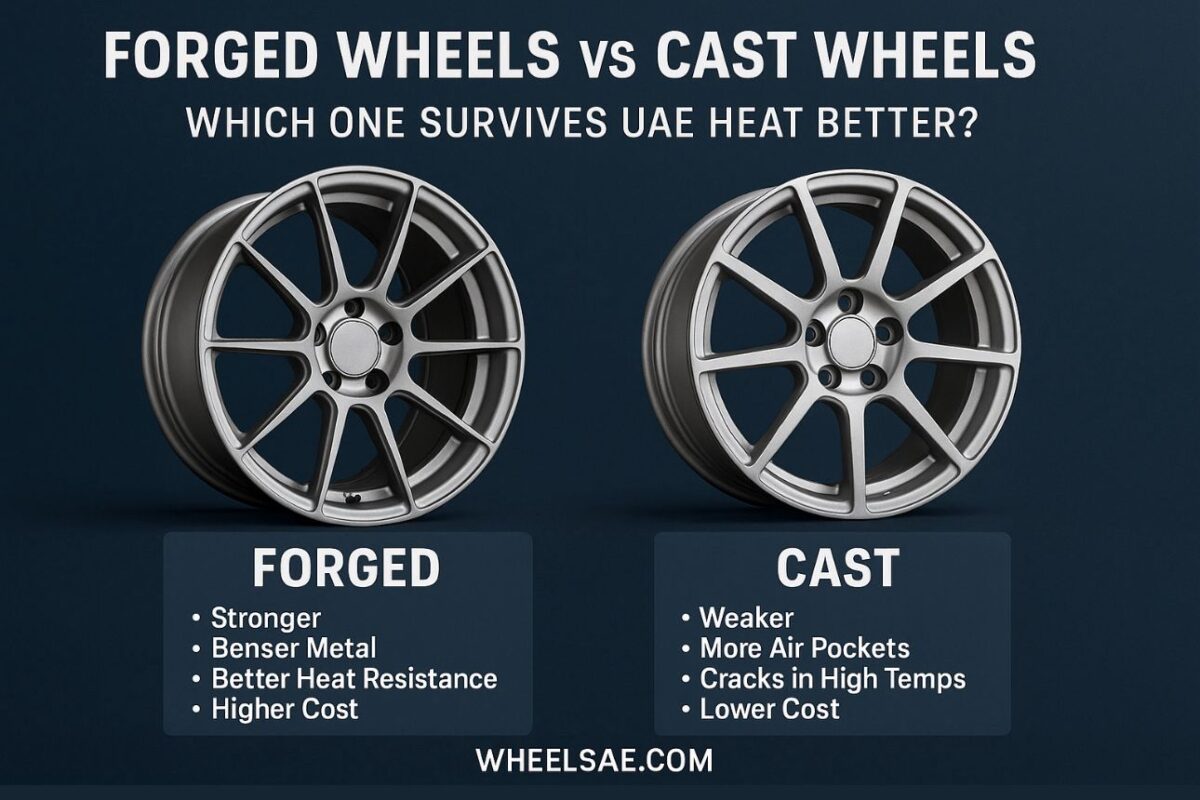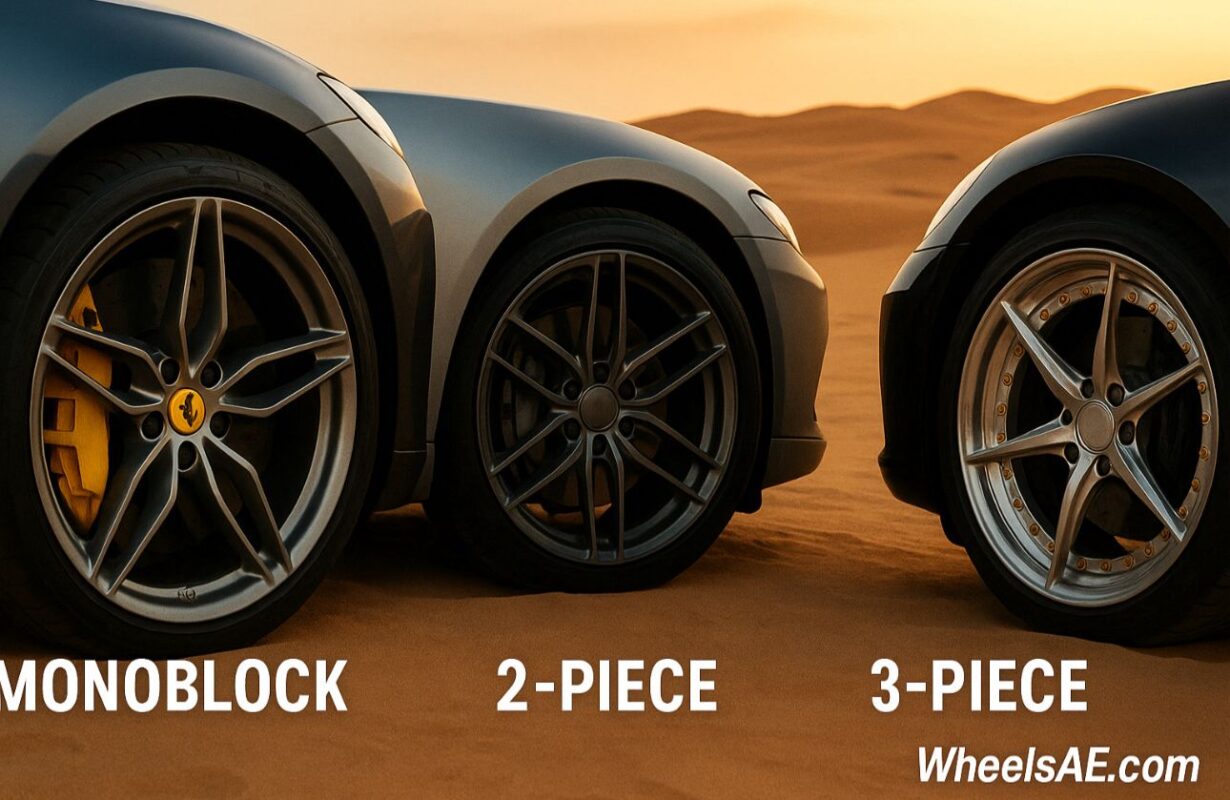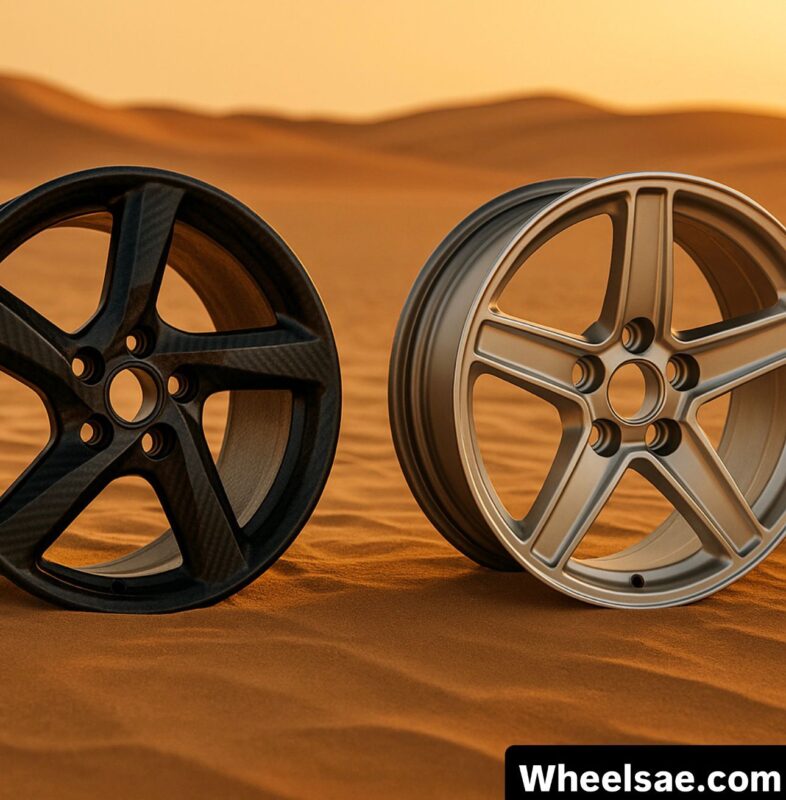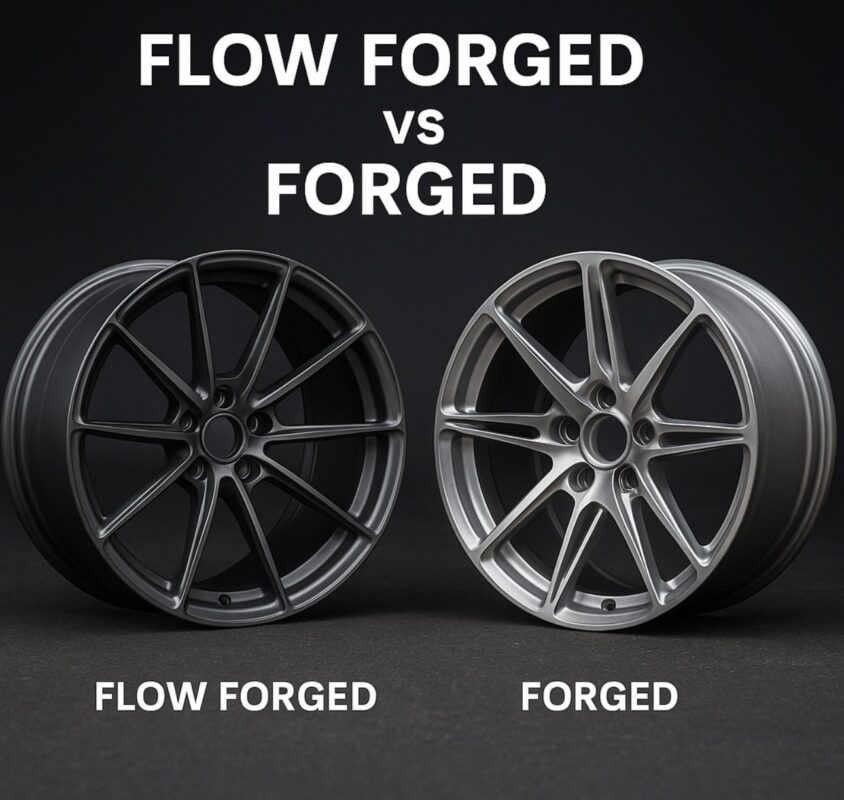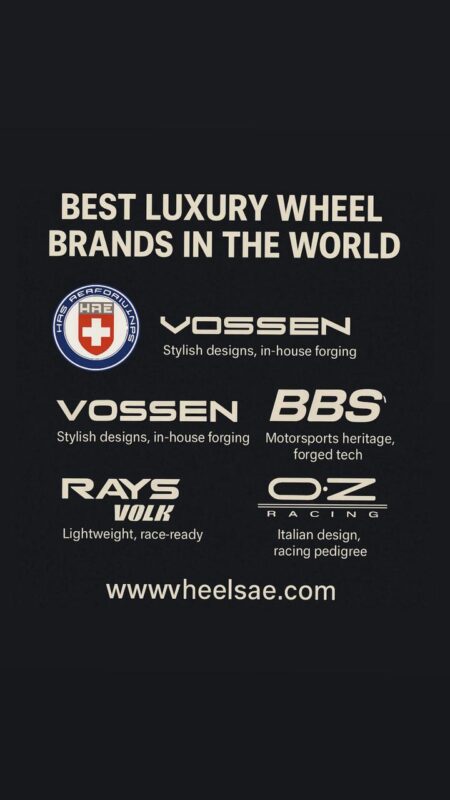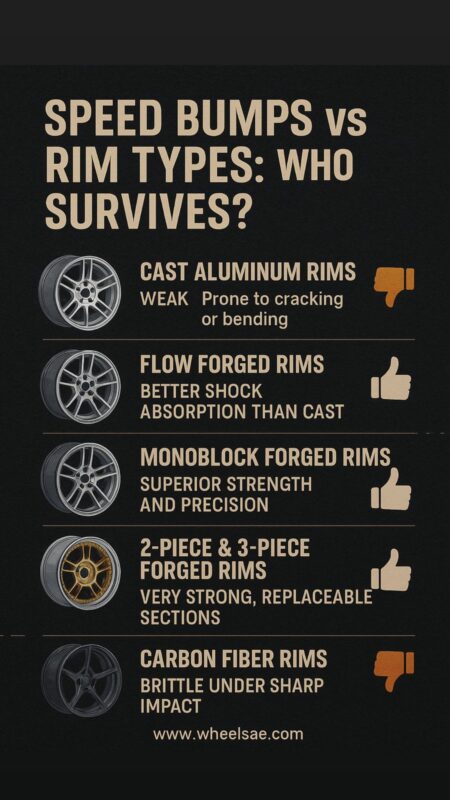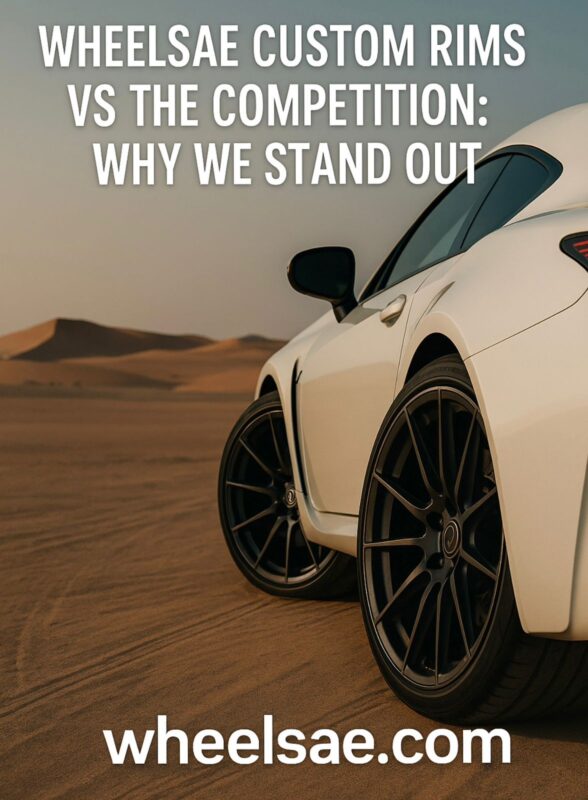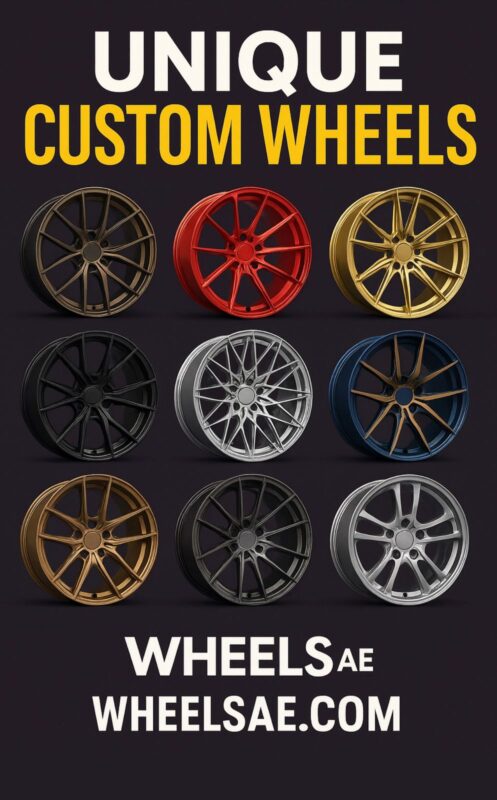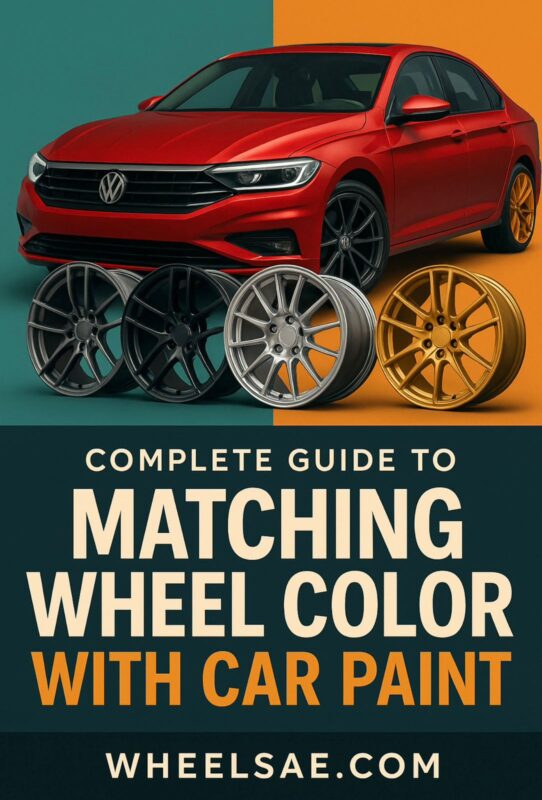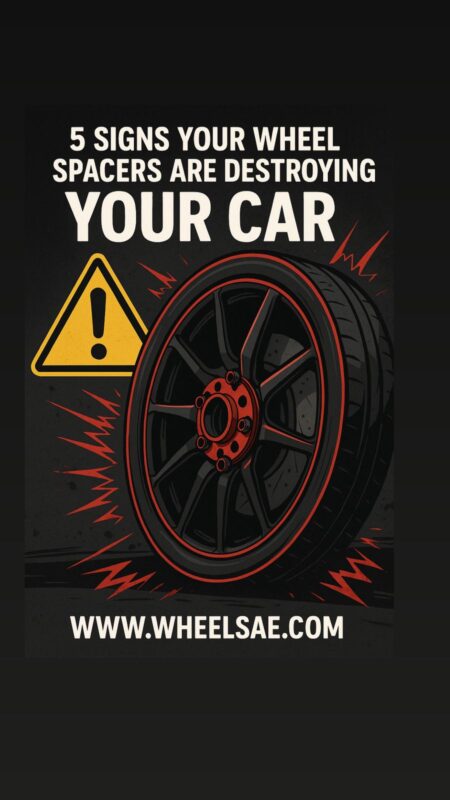Forged vs Cast Wheels – Which One Should You Choose?
When it comes to upgrading your vehicle’s wheels, one big question stands out: Forged vs Cast Wheels – which is better? This isn’t just about appearance — it’s about strength, weight, performance, price, and long-term value.
In this comprehensive guide, we’ll explore what forged and cast wheels really are, their differences, advantages, disadvantages, and which one is right for your car, whether you’re driving through Dubai’s highways or the mountain roads of Fujairah.
Forged vs Cast Wheels
⸻
What Are Forged Wheels?
Forged wheels are made using a block of solid aluminum that is heated and then compressed with extreme pressure to shape the wheel. This forging process realigns the grain structure of the metal, making it denser and significantly stronger than cast wheels.
This method results in a wheel that is not only lighter but also more durable. The strength of forged wheels makes them ideal for high-performance cars, luxury vehicles, and even off-road applications where impact resistance is critical.
⸻
What Are Cast Wheels?
Cast wheels are produced by melting aluminum and pouring it into a mold. The liquid metal then cools and hardens into the shape of a wheel. This process is simpler and more cost-effective, allowing manufacturers to create wheels in large volumes and a wide variety of styles.
While cast wheels do not match the strength of forged wheels, they are a great option for everyday drivers who want attractive designs at affordable prices.
⸻
Main Differences Between Forged and Cast Wheels
The biggest differences come down to the way the wheels are made, their weight, their durability, and their cost.
Forged wheels are stronger and lighter, thanks to the high-pressure manufacturing process. Because of their strength, they can be made with less material, reducing weight without sacrificing integrity. This results in better handling, quicker acceleration, improved braking, and better fuel efficiency.
Cast wheels, while heavier, still offer solid performance for normal road use. They are more affordable and come in many designs and finishes, making them popular among car enthusiasts who want a stylish upgrade without breaking the bank.
⸻
Advantages of Forged Wheels
1. Incredible Strength: Forged wheels are much stronger than cast wheels. They’re ideal for extreme driving conditions, whether it’s racing, drifting, or off-roading.
2. Lightweight: Because they require less material and have a denser structure, forged wheels are significantly lighter. This leads to better performance, improved suspension response, and reduced fuel consumption.
3. Long-Lasting: Forged wheels are resistant to bending, cracking, or chipping. They’re built to last for years under high stress.
4. Safety: In the event of extreme impact, forged wheels tend to bend rather than crack, giving drivers a better chance to stay in control.
5. Premium Look: Forged wheels often come with a cleaner finish and smoother lines. Their craftsmanship stands out.
⸻
Disadvantages of Forged Wheels
1. Higher Price: Forged wheels are more expensive due to the complex manufacturing process and materials used.
2. Less Variety: Because they’re harder to shape, forged wheels are usually available in fewer styles compared to cast wheels.
3. Longer Production Time: Custom forged wheels may take longer to produce and ship.
⸻
Advantages of Cast Wheels
1. Affordability: The biggest advantage of cast wheels is their price. They’re much more budget-friendly than forged options.
2. Wide Selection: You’ll find cast wheels in a huge variety of designs, finishes, and colors, perfect for customizing the look of your vehicle.
3. Good for Daily Use: For regular city or highway driving, cast wheels offer plenty of performance and reliability.
4. Easy to Replace: Cast wheels are widely available, so if one is damaged, it’s usually simple and cost-effective to replace.
⸻
Disadvantages of Cast Wheels
1. Heavier: Cast wheels weigh more, which can affect acceleration, braking, and overall driving dynamics.
2. Less Durable: Due to their more porous structure, cast wheels are more prone to cracking under heavy loads or impact.
3. Not Ideal for High-Stress Driving: If you race, drift, or frequently drive off-road, cast wheels may not provide the strength and reliability you need.
⸻
Which Wheel Type Is Right for You?
Your ideal wheel type depends on how you drive, what you expect from your wheels, and how much you want to spend.
If you’re a daily commuter who values style and affordability, cast wheels are an excellent choice. They look great, perform well, and won’t stretch your budget.
If you’re a car enthusiast who loves spirited driving, track days, or if you drive a high-performance or luxury car, forged wheels are worth the investment. They’ll give you better control, improved safety, and a long-lasting edge in performance.
⸻
Performance Comparison in Real Life
Let’s say you drive a Hyundai Elantra or Kia Sportage and you want to improve the look and handling. A good-quality cast wheel will definitely make a difference — you’ll get better aesthetics and decent performance.
But if you’re driving a Mustang, Camaro, BMW M3, or a modified Jeep, and you demand sharp handling, rapid acceleration, and safety at high speeds or over rough terrain, then forged wheels will outperform cast ones every time.
⸻
How Weight Affects Your Car
Even a 3-4 kg difference per wheel can completely change how your vehicle feels on the road. Less unsprung weight (the weight not supported by your suspension) means better steering response, faster acceleration, and smoother braking.
Forged wheels offer exactly that — lighter weight and greater agility, especially in 18–22 inch sizes.
⸻
Are Forged Wheels Worth the Price?
Yes, if you care about long-term performance and safety. Although you’ll pay more upfront, forged wheels can:
• Reduce maintenance costs (less wear on suspension and brakes)
• Last longer under rough conditions
• Add resale value to your vehicle
• Give you peace of mind during aggressive or high-speed driving
⸻
Do You Need Forged Wheels?
Not necessarily. If you’re driving in the city or on highways, and you don’t push your car to the limits, a high-quality cast wheel is perfectly fine. It’s reliable, cost-effective, and stylish.
But if you regularly drive at high speeds, off-road, or in performance settings — or you simply want the best — go forged.
⸻
Myths You Should Ignore
• “Cast wheels are weak.” – False. Cast wheels meet all safety standards and are great for daily use.
• “Forged wheels are only for racers.” – Wrong. Many luxury SUVs, trucks, and sport sedans come factory-equipped with forged wheels.
• “All forged wheels are the same.” – Not true. The forging process and final quality vary by brand. Choose reputable sellers like WheelsAE.com.
⸻
Conclusion – Which Wheel Wins?
In the debate of forged vs cast wheels, the winner depends on you.
• If your priority is budget, style, and everyday driving, choose cast wheels.
• If your focus is on strength, performance, and long-term durability, invest in forged wheels.
Both have their place. You just need to choose the one that matches your car and your lifestyle.
⸻
Shop Now – Best Wheels in UAE & GCC
Whether you’re in Dubai, Abu Dhabi, Riyadh, Doha, or Muscat, we ship fast across the UAE & GCC. Choose from our handpicked collection of cast and forged alloy wheels at:
Website: https://wheelsae.com
Instagram: @wheels_tire.ae
Need help choosing? Just send us a message — we’re always here to help you upgrade your ride.


